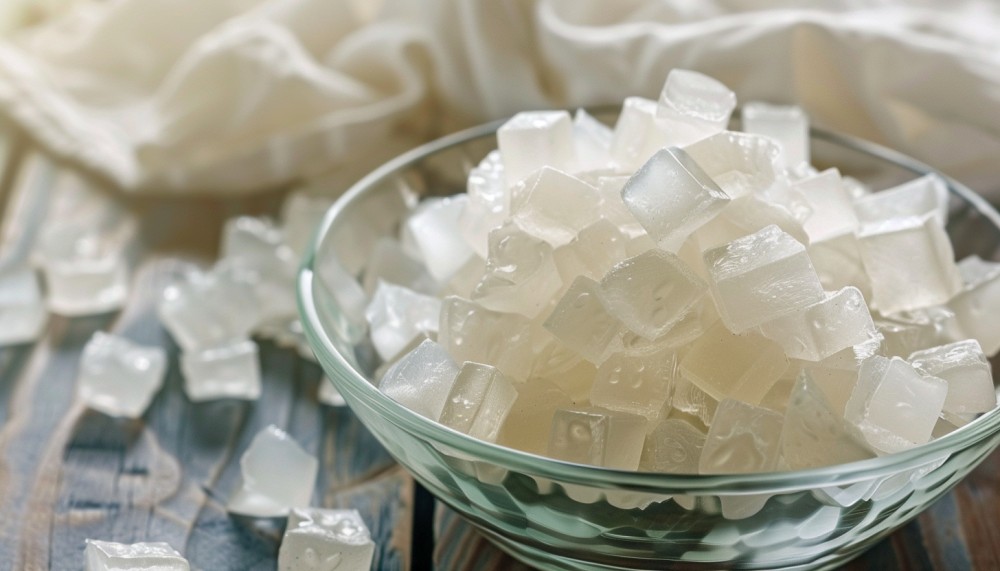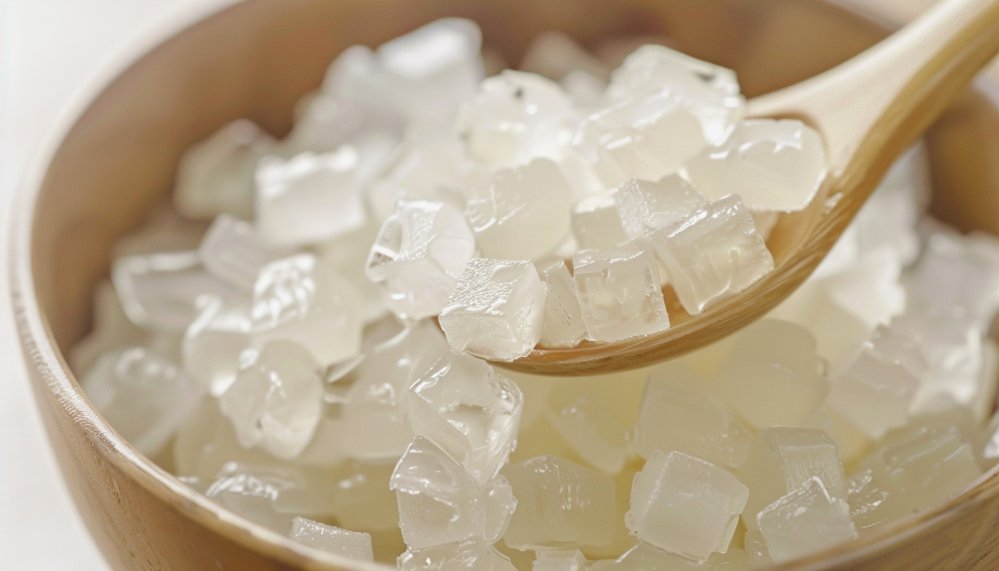Every day, there’s a new hack to lose weight.
But trends come and go, and most myths are busted while the tried-and-tested methods last. In light of that, there’s gelatin.
But wait, gelatin for weight loss? There are good reasons why it might work with science-backed evidence, which we’ll reveal as you read.
But first, here is a little background on why gelatin is healthy for you.

Nutritional Profile of Gelatin
According to the US FoodData Central, here’s a rundown of the nutritional profile of gelatin per tablespoon (approximately 7 grams):
- Calories: 10
- Protein: 6 grams
- Fat: 0 grams
- Carbohydrates: 2 grams
- Fiber: 0 gram
- Sugar: 0 gram
- Glycine: 1.3 grams
- Proline: 0.9 grams
Apart from these nutrients, gelatin is also a great source of folate (2.1 µg), calcium (3.8 mg), magnesium (1.5 mg), choline (2.7 mg), sodium and selenium (2.7 mg).
Health Benefits of Gelatin
Gelatin is a colorless, flavorless substance derived from collagen, a protein found in the connective tissues, skin, and bones of fish, cows, and pigs. Collagen, then, is broken down into amino acids like glycine, proline, and hydroxyproline. When dissolved in hot water and cooled, it forms a jelly-like consistency.
Now, what is gelatin good for? There are many benefits to using it beyond food:
- Supports healthy body tissues. A pure, powdered version of gelatin is high in protein. It is essential for building and maintaining body tissues and helping organs function. Moreover, it’s the richest food source of glycine, a protein-building amino acid that plays multiple roles in the body.
- Keeps your skin supple. As the body loses collagen due to aging, the skin becomes less firm and wrinkles and fine lines may develop. According to a 2016 study, ingesting collagen reduced wrinkles and helped the skin retain moisture in participants. Since gelatin and collagen contain similar proteins, laboratory tests indicate that gelatin may be just as good as collagen on a balanced diet.
- Stronger nails. It’s because of the collagen.
- Manages blood sugar levels. A study found that glycine, an amino acid in gelatin, may help people with type 2 diabetes manage their condition.
- Better digestion. Gelatin produces the amino acid glutamine, which helps build and repair the gut lining and promote smooth digestion.
- May help strengthen bones. Lysine in gelatin helps the body absorb calcium to keep bones strong and prevent bone loss.
- Boosts sleep quality. The high glycine content of gelatin promotes calmness and relaxation in the brain, setting the body up for a restful, timely sleep.
- Makes hair healthier. Regularly taking gelatin can boost hair growth and since it has water-binding properties, it can also improve hair hydration.

These were some of the known benefits of gelatin. Now, looking at a specific health benefit, that is, does gelatin work for weight loss?
The Link Between Gelatin and Weight Loss
To understand the effect of gelatin on weight loss, you must understand its composition. Gelatin is 98-99% protein derived from collagen, so it includes all the right proteins.
Multiple studies prove that protein-rich foods make you eat less. Protein in gelatin can trick your body into thinking you’re full. So, when you’re filled up, you tend to stop eating, which will help your weight loss efforts.
Gelatin can potentially curb appetite, research suggests. The researchers compared the appetite-suppressing abilities of two different proteins, gelatin and casein (a protein found in milk), and found that those who consumed gelatin experienced less hunger.
Moreover, gelatin promotes weight loss since it regulates appetite-controlling hormone levels. So, when these hormones work properly in the body, the brain can signal quickly when you are full.
A Brazilian research looked at how collagen protein consumption affects the different levels of appetite-control hormones. Researchers found that gelatin significantly increased the levels of GLP-1 (a fullness hormone), and the participants reported feeling less hungry after eating gelatin.
Gelatin also helps with metabolism. With our diets and lifestyles sapping our metabolism, it seems impossible to lose weight. We know almost all gelatin is protein, an essential nutrient that builds and repairs tissues and can boost metabolic rate.
Unlike fats and glucose, proteins are not stored in your body and are used up. When used, they significantly trigger your metabolism and BMR (the number of calories you burn while resting) to go up. This means gelatin helps you convert most of your calories into energy instead of storing them as fat. Even so, don’t sit around and eat gelatin all-day–exercise and a varied diet are key.
If we’re talking about weight loss, how can we ignore calories? Losing weight involves eating fewer calories than you actually burn through exercise. Gelatin contains only 83 calories per 100 grams, with tons of amino acids and no carbs. With gelatin, it’s a win-win: less food will fill you up, and you’ll potentially consume fewer calories during the day.
Research shows that sleep plays a significant role in weight loss. As you feel fuller for longer with gelatin, you won’t crave food, especially at night.
Glycine in gelatin helps you get a better night’s sleep by calming the nervous system. Better sleep leads to higher energy levels throughout the day, creating a positive cycle where improved sleep leads to better food choices and an increased desire to stay active.
So, gelatin’s satiating properties can help prevent overeating during meal times, stimulate metabolism, help you control your portions, and improve sleep quality, eventually leading to weight loss.
How to Consume Gelatin for Weight Loss
When you first hear the word gelatin for weight loss, you probably think of the gummy bears or colorful Jell-o. But that’s not what you’d want for weight loss–jell-O or other gelatin sources like candies, gummies, or marshmallows have high sugar content—counterproductive to your goal.
If you’re using a supplement or pill, ensure it’s unflavored. Or you can use plain, pure gelatin powder, which is versatile and can be used in many recipes.
Bone broth
A filling, full-blown meal packed with collagen, electrolytes, and amino acids. Add gelatin powder to your bone soup for added thickness. Melts easily and blends into the broth smoothly, giving you all the nutrients.
Smoothies
A delicious, protein-boosting breakfast or enjoy as a mid-day snack. Add a tablespoon of gelatin powder to your favorite smoothie. Whip it up with fruits, vegetables, and a liquid base like almond milk or coconut water to make it nutritious and satisfying.
Jelly desserts
Yes, you heard it right. Gelatin-based desserts like fruit jellies or panna cotta, when sweetened naturally, contain few calories and a ton of protein.
Dissolve gelatin in hot water, mix it with fruit juice or puree, and refrigerate until set. Enjoy it guilt-free!
Gummies
Healthy and fun, homemade gelatin gummies are great.
Mix gelatin powder with fruit juice and a natural sweetener like honey or maple syrup. Pour the mixture into silicone molds and let it set in the fridge.
Oatmeal
It’s good for you, especially in the morning. Add some fruits and natural syrup, it’s like a whole meal.
Now, mix up a generous amount of gelatin powder to chilled oatmeal or an oatmeal smoothie, and you’ll have a light, fluffy dessert to keep you going.

What to Consider Before Using Gelatin
Allergies
If you are allergic to animal products, gelatin may not be suitable for you. Also, it’s not for vegetarians and vegans. You can use agar agar, a seaweed-derived gelatin substitute, for thickening purposes in recipes.
Keep it pure
Choose plain gelatin powder over flavored gelatin products such as Jello because they’re often packed with sugar, artificial ingredients, and flavors.
Quality and source
Use high-quality gelatin from a reputable source. Go organic or grass-fed, as they’re free of additives and hormones.
Moderation
Too much gelatin can cause digestive issues, such as bloating or constipation. Stick to the recommended dose along with a balanced diet, and seek medical advice if necessary.
Does it Have Any Side Effects?
As we mentioned before, gelatin fills up your stomach, which can prevent you from craving food for a long time. You may also feel bloated.
Some people react allergically to gelatin, an animal-sourced protein. Concern has also been raised over the unethical extraction method.
Gelatin has little risk of spreading animal diseases, but if you have any allergic reactions, get to the doctor immediately.
If you’re pregnant or breastfeeding, consult your doctor before taking gelatin.
Gelatin can be consumed as much as 10 g a day for up to 6 months along with a well-balanced diet.
How long does it take to see the results?
There’s no fixed timeframe for results to show up. However, you should see some noticeable changes in your body weight after a few weeks. The trick is to take gelatin every day throughout this time.
However, large doses of gelatin daily are unlikely to yield results. Combine it with a balanced diet rich in protein, vitamins, and minerals.
Frequently Asked Questions
How much gelatin should I take per day?
When you start taking gelatin supplements, the National Institutes of Health suggests you can take up to 10 grams daily, reducing the amount after six months.
How much gelatin is safe per day?
It is recommended not to exceed 10 grams per day.
Is Jell-O good for a diet?
If you’re wondering if Jell-O is good for weight loss, the answer is no. It’s full of sugar and has little protein, so don’t think eating it is the way to lose weight.
Does Knox gelatin work for weight loss?
Knox manufactures gelatin, so yes. But make sure it’s unflavored so it works for you.
What happens if you eat too much Jello?
Too much Jell-O builds up your sugar levels. The artificial sweeteners in Jell-O might harm your health if you overconsume them.
Does gelatin have sugar and calories?
Pure gelatin is low in calories and free of carbs unless flavored, which may contain carbs and sugar.
Final thoughts
The benefits of gelatin for weight loss might have convinced you to try it.
Gelatin can actually be a good part of your weight loss strategy, but it shouldn’t be treated as a standalone solution or a miraculous weight loss aid. Comb together its intake with a well-rounded, healthy lifestyle. Along with gelatin, make sure you include high-quality protein like lean meats, fish, legumes, and dairy for essential amino acids and minerals. Control your portions and pairing your eating habits with regular exercise will have an even greater impact.

